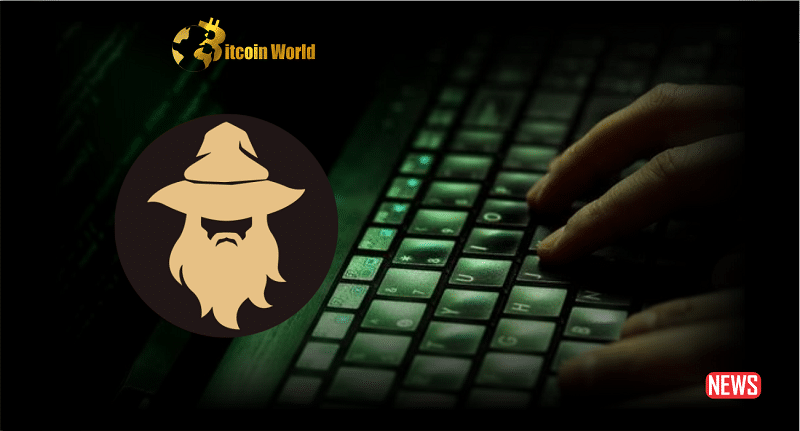Hold on to your hats, crypto enthusiasts! The world of decentralized finance (DeFi) has just been hit with another stark reminder of its inherent risks. Merlin, a decentralized exchange (DEX) operating on the zkSync layer-2 scaling solution, reportedly experienced a significant security breach, losing over $1.82 million. What makes this even more concerning? It happened shortly after the platform underwent a code audit by Certik, a well-regarded name in smart contract security.
Certik Audit and a Private Key Problem? What Happened?
Certik, the very firm that gave Merlin’s code a once-over, is now investigating the incident. Early indications point away from a flaw in the smart contract code itself. Instead, the spotlight is on a more fundamental, yet often overlooked, aspect of crypto security: private key management. Certik has emphasized that while their audits rigorously assess code vulnerabilities, they can’t control how projects manage their private keys – the crucial passwords to their digital vaults.
Think of it like this: you can install the best security system in your house (the code audit), but if you leave the key under the doormat (poor private key management), you’re still vulnerable. This situation with Merlin highlights a critical truth in DeFi: robust security is a multi-layered approach.
How Did This Happen Despite Security Measures?
Even with Merlin’s implemented security protocols, the hackers managed to find a way in. This raises some serious questions:
- Was there a lapse in the secure storage of private keys?
- Were there internal vulnerabilities that were exploited?
- Did social engineering play a role in compromising key holders?
This incident serves as a powerful reminder that in the ever-evolving landscape of cyber threats, DeFi projects must remain vigilant and continuously strengthen their defenses. Complacency simply isn’t an option.
What is Merlin DEX and Why the Buzz?
For those unfamiliar, Merlin is a decentralized exchange built on zkSync. zkSync is a layer-2 scaling solution for Ethereum, designed to make transactions faster and cheaper by reducing those pesky gas fees. Merlin has gained traction in the DeFi space due to its:
- Lower Transaction Costs: Leveraging zkSync significantly cuts down on gas fees.
- Faster Transaction Speeds: Layer-2 solutions offer quicker transaction processing.
- User-Friendly Interface: Making DeFi more accessible to a wider audience.
These advantages have made Merlin a popular choice among DeFi users looking for efficiency and affordability.
The Team’s Response: What We Know So Far
While an official statement from the Merlin team is still awaited, they have reportedly assured users that their funds are safe. They’ve also indicated they are actively working to resolve the situation. This kind of communication, even if brief, is crucial for maintaining trust during such crises.
The Role of Code Audits: Are They Still Important?
Absolutely! The Merlin hack doesn’t diminish the importance of code audits. Think of them as a vital health check for smart contracts. Here’s why they remain crucial:
- Identify Potential Vulnerabilities: Audits can uncover coding errors and security flaws that developers might miss.
- Improve Code Quality: The audit process often leads to better coding practices and more robust smart contracts.
- Enhance Trust and Transparency: A successful audit can provide users with greater confidence in a project’s security.
However, as the Merlin incident illustrates, audits are not a silver bullet. They are one piece of a larger security puzzle.
Key Takeaways and Actionable Insights for the DeFi Space
The Merlin hack, while unfortunate, offers valuable lessons for the entire DeFi ecosystem:
- Prioritize Private Key Management: Implementing robust and secure methods for generating, storing, and managing private keys is paramount. This includes multi-signature wallets, hardware wallets, and secure multi-party computation (MPC).
- Adopt a Multi-Layered Security Approach: Relying solely on code audits is insufficient. Implement comprehensive security measures across all aspects of the project.
- Continuous Monitoring and Vigilance: The threat landscape is constantly evolving. Regular security assessments, penetration testing, and bug bounty programs are essential.
- Transparency and Communication are Key: In the event of a security incident, prompt and transparent communication with the community is crucial for maintaining trust.
- Community Collaboration is Vital: Sharing knowledge, best practices, and insights within the DeFi community can help strengthen the overall security posture of the space.
Looking Ahead: Building a More Secure DeFi Future
The Merlin hack is a sobering reminder that the DeFi industry is still maturing, and security remains a significant challenge. While these events can be disheartening, they also provide valuable learning opportunities. By working together, sharing knowledge, and prioritizing security at every level, the DeFi community can build a more resilient and trustworthy financial ecosystem for the future.
Disclaimer: The information provided is not trading advice, Bitcoinworld.co.in holds no liability for any investments made based on the information provided on this page. We strongly recommend independent research and/or consultation with a qualified professional before making any investment decisions.




